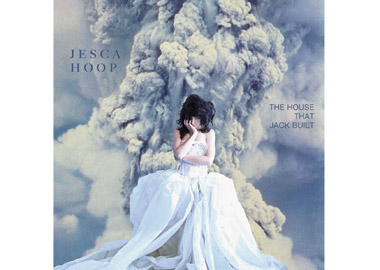Jesca Hoop
The House That Jack Built
(Bella Union)
Ever since I first heard her, Jesca Hoop’s eccentric and slightly unhinged music has been in steady rotation on my stereo. In the same way that Kristin Hersh, Radiohead or Sinead O’Connor took me by surprise and held me captive with their strange but utterly enchanting music, Hoop’s songs offer exotic textures you simply can’t find anywhere else. Listening to her new album, though, I began to get a sense of déjà vu—I’d heard this brand of strange before: quiet, moody lyrics sung softly and then punctuated by frantic rhythms and nursery rhyme-like chants. Instead of exuding enchantment, many songs on the new album feel like retreads. Occasionally, as with the title track, she drops the affectation, stops trying to be weird for the sake of being weird, and lets her lyrics, guitar and wonderful voice do what they do best. The rest, though, feels like a triumph of style over substance. —Mark Roessler
*
Julia Holter
Ekstasis
(Rvng Intl.)
Julia Holter’s sophomore release deftly balances song craft and atmosphere to create music that’s brimming with both memorable melodies and gauzy textures. Some tunes, like “Marienbad,” feature distinct choruses and dramatic crescendos, while others, like “Boy in the Moon,” lean more on lush, woozy synth drones. The songs seamlessly weave unlikely elements such as found sound snippets, tympani and harmonium into a rich and beguiling tapestry, and constantly shape-shift, highlighting different sonic elements and keeping the listener pleasantly off balance. Holter’s arch and theatrical delivery can be an acquired taste, but give her intricately layered concoction of pop, folk, and ambient music a chance and it’ll worm its way into your head. Naggingly familiar but impossible to pin down, Ekstasis is that rare record which feels both out of time and completely of the moment. —Jeff Jackson
*
Frozen Corn
Blueberry Honey #35
(Blueberry Honey)
Though I’m usually loath to embrace any sort of “lo-fi” recording technique that actually makes the audio sound worse, the DIY element of this seven-song EP proves an exception to this rule. The barely-produced, occasionally distorted sound quality of this recording actually enhances its banjo-centric, dark bluegrass vibe, and really gives it the feeling of thick, 1930s 78 rpm Bakelite. The material here is largely a collection of traditional American songs like “The Cuckoo” and “Jack of Diamonds,” and includes an interpretation of Ralph Stanley’s “Poor Rambler” that pretty much encapsulates the devil-whiskey-jailhouse motif of the whole release. Most of the songs are drony and in no hurry to end (some are over seven minutes long); performance, while not outstanding, is honest and worthy of admiration if only for its homage to such endangered American gems. —Tom Sturm



